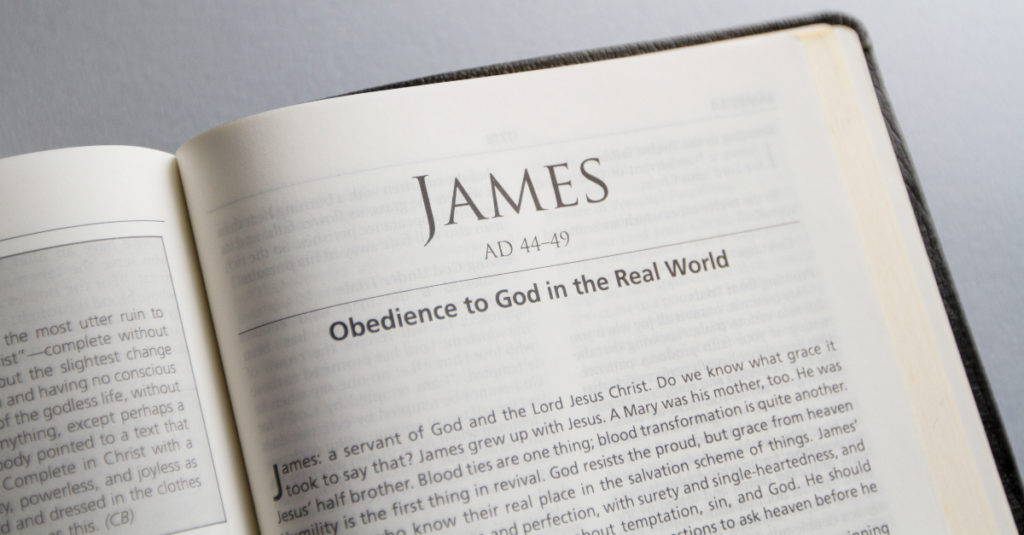Paul vs. James
- Two seemingly contradictory doctrinal statements about faith and belief:
Rom: 4:1-5 vs. James: 2:14 – Eph. 2: 8-9
- Different authors, writing to different audiences for a different purpose.
- Semantics – the same words can be used in different ways: Ex. Salmon run up stream,
wife has a run in her hose. A marathon run.
Biblical Examples
Salvation – 3 Uses:
- Initial Salvation – Eph. 2:8 – Deliverance from the penalty of sin, justification.
- Daily Salvation – 1 Tim 4:16 – Deliverance from the power of sin, sanctification.
- Salvation to heaven – Rom. 5:9-10 – Deliverance from presence of sin, glorification.
Justification – 2 Kinds:
- Your walk matches your talk, so you are justified before men, proven, experientially.
- Right standing before God through the blood of Christ non- experiential. You don’t feel
it or see it or deserve it.
Therefore, Paul is talking about God declaring you justified, but James talks
about an experience before men. They know Abraham and Rahab were justified
because of what they did.
- James – Half-brother of Jesus, leader of Jerusalem church. – 16 references to faith in James.
- Written to Jewish Christians scattered because of persecution Acts 8:1
- Date – early 46 – 48 AD
- Occasion – The early Christians were persecuted by fellow Jews and tended to hide
their faith.
- Purpose – To encourage them in trials and admonish them to use their faith, live it out,
and act on it. Their behavior should show evidence of their faith.
III. Do James and Paul agree on the means of salvation from the penalty of sin?
- James 1: 17-18 Salvation is a gift of God, not a work of man.
- Acts 11: 17-18 We worked all our lives as Jews under the law, now these outsiders
just walk in without doing anything.
- Acts 15:1, Acts 15:13, Acts 15:19 Jerusalem council, demands to do and obey
change to suggestions for unity.
- 2 Peter 3:15 Peter confirms Paul’s inspiration.
- James’s Argument.
- Not concerned with initial salvation.
- He is concerned that their professed faith is visibly operative.
- James teaches how a life of faith should be manifested, worked out, proven.
- response to trials 1:2-12
- response to temptation 1:13-18
- discrimination 2: 1-13
- good works 2:14-26
- self-control 3: 1-18
- prayer 5:13-18
- What is the relationship of faith to works?
- A faith without works is only intellectual assent 2:19
- Abraham and Rahab are examples.
- Don’t stop at being saved, be mature and complete.
- Contrast Paul’s use of Abraham (Rom.4) with James’s use of Abraham (James 2:21)
- Paul refers to works of the “Law” but James refers to moral deeds flowing from genuine faith.
- James says Abraham was considered righteous or proven to be righteous by obedience
while Paul said Abraham was declared righteous by God because of his faith.
- Paul refers to Gen. 15 but James refers to Gen. 22.
- Abraham was saved in Gen. 15 and proved it in Gen. 22.
- Different Questions:
- Paul – How can people alienated from God by sin gain acquittal and a righteous
standing before God – by deserving it or receiving God’s gift by faith?
- James – Which kind of faith is genuine?
- speaks only
- speaks and acts
- Summary Statement
Paul and James seem to be at odds, but in reality, they are addressing different issues.
In Acts 15 we have a historical account of their complete agreement on the issue of salvation.
Therefore, it is safe to say that Paul is addressing the means of salvation and James is addressing
the result of salvation.

